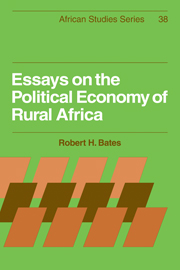Book contents
- Frontmatter
- Contents
- Dedication
- Acknowledgements
- Introduction
- Part I The pre-colonial period
- Part II The colonial period
- 3 Pressure groups, public policy, and agricultural development: a study of divergent outcomes
- 4 The commercialization of agriculture and the rise of rural political protest
- Part III Agrarian society in post-independence Africa
- Conclusion
- Notes
- Index
3 - Pressure groups, public policy, and agricultural development: a study of divergent outcomes
Published online by Cambridge University Press: 26 January 2010
- Frontmatter
- Contents
- Dedication
- Acknowledgements
- Introduction
- Part I The pre-colonial period
- Part II The colonial period
- 3 Pressure groups, public policy, and agricultural development: a study of divergent outcomes
- 4 The commercialization of agriculture and the rise of rural political protest
- Part III Agrarian society in post-independence Africa
- Conclusion
- Notes
- Index
Summary
Under the impact of European colonization, two forces assumed new importance in the rural areas of Africa: the market and the nation-state. Both combined to promote the commercialization of agriculture and they thereby fundamentally altered economic, social and political relations in the African countryside. The next two essays focus on significant aspects of this transformation. The first analyzes the basis for contrasting patterns of agricultural development; the second the agrarian origins of political protest in the colonial period.
Ghana and Kenya constitute two of the most prominent cases of the agricultural development in colonial Africa. In the one case, producer interests became paramount in the colonial period; in the other, the interests of producers were sacrificed to those of other sectors. This essay examines the divergent patterns of growth of commercial agriculture in Ghana and Kenya and tries to account for the contrasting outcomes of the process of agrarian development.
MAJOR MARKETS FACING PRODUCERS
By examining the major markets faced by producers and by noting the major distortions that prevailed in each, we can establish the economic standing of the two classes of producers relative to each other and to other segments of their respective industries, thereby providing a baseline for the rest of the analysis.
Inputs into farming
Commercial farming requires access to factors of production. In this section I will examine and compare the conditions under which they were acquired.
One of the major contrasts between the two cases arises in the market for labor. We know a lot about the relationship that the Kenyan commercial farmer bore to the market for labor; we know very little about that of the Ghanaian cocoa farmer.
- Type
- Chapter
- Information
- Essays on the Political Economy of Rural Africa , pp. 61 - 91Publisher: Cambridge University PressPrint publication year: 1983
- 2
- Cited by



